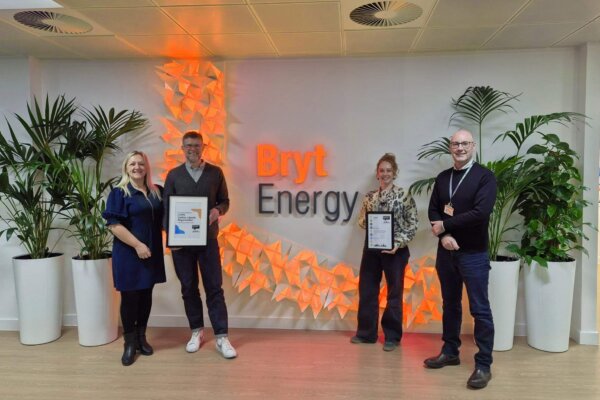This month’s Bryt Insight explores some exciting recent developments in the UK’s energy transition, including increased smart meter installations as well as crucial improvements in grid connections and renewable energy infrastructure. We also look at the new Government’s request for expert advice on the UK’s 2035 carbon reduction target. Here’s what you need to know this month:
Bryt Energy Market Update
Long-term wholesale electricity prices
Short-term wholesale electricity prices
REGO Prices
IMPROVING THE GRID CONNECTION PROCESS TO ACCELERATE THE ENERGY TRANSITION
UK GOVERNMENT SEEKS CLIMATE TARGET ADVICE FOR 2035
SMART METERS INSTALLATIONS INCREASED BY 17% IN JULY
SPOTLIGHT ON RENEWABLES
NEWS IN BRIEF
SPOTLIGHT ON STATKRAFT
Bryt Energy Market Update
Long-term wholesale electricity prices
This past month has seen longer-term wholesale electricity prices (both monthly & seasonal) rising due to conflict between Russia and Ukraine. This conflict has pushed longer-term gas prices up and, in turn, had a major influence over electricity prices, which reached levels not seen since the spike in May earlier this year. There was a temporary reduction in prices mid-August, but as the incursion in Kursk continued, prices began to rise again. The Kursk region in Russia holds key gas pipeline infrastructure that, if compromised, could reduce the gas supplied into Europe by up to 7% of the annual demand. With the conflict threatening risk of disruption to this pipeline, gas, and therefore electricity, prices increased.
The heatwave across Europe, which has been forecast to continue into late September, has also influenced the increase in prices, with power generators warning of reduced outputs. For example, the French nuclear fleet has been disrupted as soaring temperatures in the rivers that are used to cool the reactors caused generation output to be reduced.
Short-term wholesale electricity prices
On the other hand, we have seen short-term prices (within day, day-ahead, within month) fall on the wholesale electricity market in August. This is due to increased availability of supply in the UK, including three nuclear reactors being back up and running following maintenance, as well as surging wind generation across the month, both helping to reduce prices by on average 20%, compared to the final two weeks of July. The extra wind generation has also meant that the UK is not importing through the interconnectors from Europe, where prices have been high due to the recent heatwave. However, wind generation has been forecast to drop as we enter September, so it is expected that the short-term prices may increase.
REGO Prices
The market has seen prices for Renewable Energy Guarantees of Origin (REGO) certificates fall over the last month, and the variance between the cost of biomass REGO’s and Solar, Wind and Hydro REGOs is 65p.
IMPROVING THE GRID CONNECTION PROCESS TO ACCELERATE THE ENERGY TRANSITION
The UK’s ongoing transition to a net zero energy system has received a significant boost, with recent developments aimed at improving the speed and efficiency of connecting renewable energy projects to the grid going ahead. A grid connection allows energy to be added to or taken from the electricity transmission network – so delays in renewable connections are seen as one of the biggest obstacles to the UK’s decarbonisation efforts.
Here are three key initiatives set to make a substantial impact:
Approval of “superhighway” fast-tracked
Ofgem has fast-tracked the approval of a £3.4 billion electricity “superhighway” to accelerate the transmission of renewable offshore wind energy between Scotland and England1. The subsea and underground cable network will be 500km long, connecting Aberdeenshire to Yorkshire, helping maximise the potential of the wind generated in Scotland for the rest of the UK to use. Named the Eastern Green Link 2 (EGL2), the project delivers a 2GW high-voltage electricity link and aims to power an equivalent of up to 2 million homes with renewable electricity from offshore wind. It is the first under Ofgem’s Accelerated Strategic Transmission Investment (ASTI) – a framework introduced to accelerate the delivery of grid upgrades.
Connecting floating offshore wind energy in the Celtic Sea
In another major move to enhance the UK’s renewable energy capacity, National Grid ESO (Electricity System Operator) has announced plans to connect up to 4.5GW of floating offshore wind energy in the Celtic Sea2. This will involve three new wind farms, each with its own connection to the mainland electricity network. The innovative network design will connect offshore farms with locations in South Wales and South-West England. National Grid ESO says the final design has been chosen to minimise environmental and community impact, while optimising cost and operability.
Plans for significant changes to the SIF programme
It’s not just major transmission infrastructure projects in the pipeline – Ofgem also plans to introduce significant changes to the Strategic Innovation Fund (SIF), which was set up to fund and support new technologies that could accelerate the decarbonisation of gas and electricity networks3. The changes will include more frequent funding rounds and a more streamlined process, enabling successful projects to progress through the programme faster.
Together, these initiatives are encouraging news for improving the UK’s transmission network, speeding up connection queues and getting more renewables onto the grid. All of which will be crucial in meeting the UK’s net zero targets.
UK GOVERNMENT SEEKS CLIMATE TARGET ADVICE FOR 2035
The UK Government has formally requested the Climate Change Committee (CCC), the Government’s independent advisor on climate change, to recommend a carbon reduction target for 20354. In a letter to the CCC, the Secretary of State for Energy Security and Net Zero (DESNZ), Ed Miliband, asked for guidance to help shape the UK’s updated Nationally Determined Contribution (NDC). An NDC is a set of climate targets and mitigation actions that each country that is signed up to the Paris Agreement (including the UK) must submit to the United Nations (UN) every five years5. The next updates must be submitted by February 2025, but many countries are expected to publish their NDCs in time for the next Conference of the Parties climate summit (COP29) in November.
This move underscores the UK’s ongoing commitment to its legally binding net zero target by 2050 and its broader international obligations under the Paris Agreement. The CCC’s recommendations will play a crucial role in defining the UK’s climate strategy for the coming decade.
In the letter, Mr Miliband has also specifically requested the CCC’s views on whether international aviation and shipping emissions should be included in the 2035 target. These sectors are currently significant sources of carbon emissions and hard to decarbonise, and their inclusion could affect the overall target, and the strategies needed to achieve it.
It is encouraging to see the Government take a proactive approach in seeking expert advice on the UK’s decarbonisation strategy. The move highlights the importance of setting ambitious, yet achievable, climate targets. To read more, and to download a copy of the Government’s letter, click here.
SMART METERS INSTALLATIONS INCREASED BY 17% IN JULY
Data released by ElectraLink has revealed that smart meter installations saw a surprising jump in July, with 30,000 (17%) more meters installed than in June6. Even though installations in July 2024 were lower than July 2023, total installations for the first half of 2024 are higher than the same period in 2023 – 1.39 million compared to 2023’s 1.36 million.
This news is important because smart meters are essential for a smarter, more efficient grid and for reaching the UK’s net zero target. When paired with data visualisation tools, they make billing and energy usage forecasts more accurate, helping reduce energy wastage as well as costs. Smart meters are also key in supporting the creation of a ‘smart grid’, with better analysis and monitoring of energy usage playing a key role in balancing a net zero energy system.
There’s still a lot of work to be done, as new data has highlighted that the UK is behind many EU countries on their smart meter installations7. Nevertheless, this news demonstrates an increase that we hope will continue.
To find out more about the importance of smart meters, you can read our blog here. You can also read our myth-busting Q&A, answering some of the most common questions and myths surrounding smart meters, here.
SPOTLIGHT ON RENEWABLES
UK wind capacity milestone reached
The UK’s total installed onshore and offshore wind capacity has surpassed the significant milestone of 30GW8. To reach this total number, the UK’s wind capacity has doubled in only seven years – demonstrating the rapid scalability of renewables and a positive indicator for meeting the UK’s new target of 50GW by 2030.
UK public shows support for accelerating renewable energy projects
New research from RenewableUK reveals that 61% of the UK public feel frustrated when local renewable energy projects supported by the majority are blocked by a small number of objectors9. The poll, which surveyed more than 10,000 people, also shows strong support for the construction of new grid infrastructure to speed up the deployment of renewable energy, with 59% in favour, showing firm support for renewables.
Infrastructure funding package to boost renewable innovations
The UK and Welsh Governments are supporting a £60 million project to improve infrastructure at a Welsh port through the Swansea Bay City Deal, which has proven to attract the attention of renewable energy generators and investors around the world10. Part of the Pembroke Dock Marine development funds will go towards enhancing the Pembrokeshire Demonstration Zone – an initiative set up to drive local innovation and key focus areas including scaling renewable energy generation and decarbonising both port operations and shipping.
NEWS IN BRIEF
UK heat pump installations reach new milestone
A significant milestone of 250,000 heat pumps have been installed and certified in the UK, as reported by the Microgeneration Certification Scheme (MCS)11. In the period between January-July 2024, over 30,000 heat pumps were installed – a 45% increase compared to the same period in 2023, putting the UK on track to have a record-breaking amount of heat pump installations this year. Much of the increased demand of heat pumps can be accredited to Government incentives, such as the Boiler Upgrade Scheme (BUS), which provides up to £7,500 to prospective businesses and households looking to install heat pumps12.
To learn more about how heat pumps can fit into your business’s sustainability strategy and enable the decarbonisation of heat, read Part 3 to our guide on ‘Navigating the Net Zero energy transition’, here.
New ‘Energy Crisis Commission’ is launched
With the objective of analysing the UK’s response to increasing gas prices that come from international conflicts, a new ‘Energy Crisis Commission’ has been launched, compiled of experts from CBI, Energy UK, Citizens Advice and National Energy Action13. The commission will assess the UK’s response to the global energy crisis, which was a result of Russia’s invasion of the Ukraine and the UK’s reliance on the import of foreign fossil fuels, and advise how Britain could be better prepared for future price increases amidst geopolitical conflict.
The Energy Crisis Commission intends to gather their findings over the summer and in Autumn, publish their recommendations to the UK Government regarding ways the country can become more resilient against future crises.
Weather damage insurance claims in the UK rise
We are continuing to see the devastating impacts of climate change through adverse weather events such as storms and floods, with a record £1.4 billion of weather damage insurance claimed in the UK in Q2 of this year 14. According to the Association of British Insurers (ABI), these claims were the result of frozen pipes, storms and heavy rain damaging homes and businesses, with £81 million paid specifically to businesses by insurers in Q2 of this year.
The CCC (Climate Change Committee) has warned that climate change will continue to increase the instances of extreme weather, and more needs to be done to prevent further warming damages15.
You can read the report here.
Guidance on electrifying commercial fleets published by Energy Savings Trust and REA
A whitepaper titled ‘Electrifying the Fleet: A Practical Resource for Fleet Managers’ has been published by Energy Savings Trust and the Association for Renewable Energy and Clean Technology (REA)16. The paper provides guidance and insight into the pathways and financial benefits of electrifying commercial vehicle fleets, as well as ways to overcome the potential obstacles. It estimates that each light commercial vehicle (LCV), such as a small-to-medium sized van, driving 15,000 miles a year could save fleet managers £1,500 annually if electrified, while certain electrified HGVs could save £3,500 driving the same distance annually.
Decarbonising transport is essential for a net zero future, and it’s great to know that adapting to the energy transition will also reap significant financial rewards. To find out more about the role of electric vehicles in the energy transition and the potential business benefits for adopting them, read Part 3 of our guide, ‘Navigating the Net Zero energy transition’, here.
SPOTLIGHT ON STATKRAFT
As part of the Statkraft Group, this month we are sharing a few of their key updates:
Mossy Hill wind farm redesign
Statkraft have recently redesigned plans for their Mossy Hill wind farm in Shetland, Scotland, to improve access to the public and provide more amenities for Statkraft’s own employees17. The redesign includes eight wind turbines instead of the previous 12, although the turbines will be 10 metres taller than previously, and will provide space for employee facilities. This decreases the capacity from 48MW to 36MW, but allows them to take on board community feedback.
The importance of grid stability in the energy transition
Statkraft have released two new articles, which explore the importance of grid stability, and how the obstacle of inertia can be overcome in the energy transition18.
‘Inertia’ is the energy stored in the rotating parts of fossil fuel power plant turbines that keeps them spinning even if the power plant temporarily loses power. It prevents disruption to the energy flows and is key for grid stability. Fossil fuels inherently provide the grid with stability through inertia, but renewable generation from solar and wind power doesn’t have the same rotating parts. This means that, even when the UK has enough renewable energy to power the grid, fossil fuels are currently still required to provide grid stability.
However, Statkraft are combatting this problem through the creation of Greener Grid Parks (GGPs). GGPs are a collection of small buildings containing flywheels and synchronous compensators, which are rotating stabilisers, and can create inertia to stabilise the grid, without the use of fossil fuels.
TALK TO OUR TEAM
If you have any questions on how any of the updates might affect your business, our team of experts is on hand to answer them. You can get in touch with us on 0330 053 8620 or at heretohelp@brytenergy.co.uk.
Sources
- https://www.ofgem.gov.uk/press-release/proposed-anglo-scottish-electricity-superhighway-first-clear-final-fast-track-funding-hurdle
- https://www.nationalgrideso.com/news/eso-unveils-proposal-connect-45gw-clean-power-celtic-sea-and-boost-growth-south-wales-and-south-west
- https://www.ofgem.gov.uk/press-release/ofgem-announce-new-approach-strategic-innovation-fund-drive-progress-net-zero-2030
- https://www.gov.uk/government/publications/uk-2035-nationally-determined-contribution
- https://unfccc.int/process-and-meetings/the-paris-agreement
- https://www.electralink.co.uk/2024/08/energy-market-insight-july-smart-installs-increase/#:~:text=Nationwide%20smart%20meter%20installations%20had,installs%20in%20July%20last%20year
- https://industrialnews.co.uk/britains-smart-meter-rollout-lagging-shows-study/
- https://www.renewableuk.com/news/680888/UK-wind-power-reaches-historic-30GW-milestone.htm
- https://www.renewableuk.com/news/679361/Polling-shows-most-people-feel-frustrated-when-renewable-energy-projects-are-blocked.htm
- https://www.mhpa.co.uk/latest-news-and-blog/deputy-prime-minister-prif-weinidog-and-welsh-secretary-launch-pembroke-dock-marine-a-new-green-energy-hub-for-wales/
- https://mcscertified.com/uk-reaches-250000-certified-heat-pump-installations/
- https://www.gov.uk/apply-boiler-upgrade-scheme
- https://energycrisiscommission.uk/
- https://www.abi.org.uk/news/news-articles/2024/8/property-insurance-payouts-hit-record-quarterly-high/
- https://www.theccc.org.uk/2021/09/14/its-time-to-turn-the-tide-on-uk-adaptation-action/
- https://www.r-e-a.net/wp-content/uploads/2024/08/Electrifying-the-Fleet-REA_and_EST-August2024.pdf
- https://www.statkraft.co.uk/newsroom/2024/statkraft-sets-out-revised-plans-for-mossy-hill-wind-farm/
- https://www.linkedin.com/pulse/future-proofing-wind-power-innovative-grid-stability-technology-rudue/?trackingId=uIM7%2B3Go8KzfmzhuT5FYYw%3D%3D
- https://www.newcivilengineer.com/opinion/repurposing-for-renewables-strategies-for-stability-in-the-move-to-a-zero-carbon-grid-08-08-2024/


